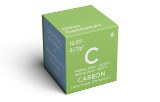
Carbon-14 (C-14)
Carbon has three natural isotopes: carbon 12 (C-12), which represents 99% of the carbon isotopes, carbon-13, which is 1%, and carbon-14, which is present as trace Atoms per 1012 carbon atoms in the atmosphere).
Carbon 14 or Barium carbonate is a radioactive isotope or radioisotope of carbon. Its mass number is 14 and it is noted C-14. Its core contains 6 protons and 8 neutrons. It is formed during the absorption of neutrons by the nitrogen atoms of the stratosphere and the upper layers of the troposphere. Its only mode of disintegration is by the emission of a beta particle (beta radiation) causing a transmutation in nitrogen 14 (N-14). Carbon 14 has a radioactive period of 5700 years and was the only carbon radioisotope to have applications, which is why it is also called radiocarbon.
The main application of carbon 14 is dating. Carbon-14 dating or dating by counting residual carbon is a radiometric dating method based on the measurement of the radiological activity of the carbon 14 contained in the organic matter whose absolute age is desired.
During its lifetime, every living organism assimilates carbon and in particular a certain proportion of Carbon 14. After its death, the amount of radiocarbon it contains and its radioactivity decrease over time according to an exponential curve.
The 14C dating method is based on the presence of radiocarbon in a small proportion in the samples of organic matter.
Risultati della ricerca : 3 prodotto(i) trovato(i)
Limita la ricerca :
RUOCE / IVD
- [14C] 3
- Radiochemicals 3
Cat#
Descrizione
Cond.
Priced
ARC-0109A-5
5mCi/185MBq
ARC-0109A-25
25mCi/925MBq
‹
›

